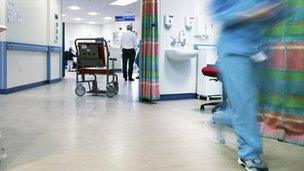Budget pressures focus of Welsh NHS confederation conference
- Published

The NHS is unlikely to break even at the end of the year
Financial pressure inside the NHS in Wales will be discussed at a conference of health professionals later.
The Welsh NHS Confederation, meeting in Cardiff, will look at how to respond to budget cuts.
Health Minister Lesley Griffiths will address the body, which represents seven health boards and three NHS trusts.
On Wednesday, she denied a bailout after announcing £82m "contingency funding" for health boards.
Ms Griffiths said the cash would help the NHS cope with pressures.
She has previously warned LHBs not to expect bailouts at the end of the year and said they must hit their financial targets.
In the red
The minister said she was responding to "unprecedented" pressures on the NHS this year, particularly in emergency care.
A mid-year review by officials in her department found the increased number of elderly patients needing to be seen at hospital was bigger than predicted and could have a knock-on effect by delaying treatment for other patients.
The extra funding is roughly equivalent to 1.5% of the entire NHS budget.
The extra funding comes after the Wales Audit Office (WAO) forecast the NHS is likely to be £70m in the red by the start of the next financial year in April 2013, with a worst-case scenario of a £130m deficit.
The Conservatives called NHS funding "an unsustainable disaster," while Plaid Cymru accused the Welsh government of not getting a grip of the health service.
Welsh Liberal Democrat leader Kirsty Williams added: "I struggle to see how this can be described as anything other than a bailout".
But the Welsh NHS Confederation, holding its annual conference at the Cardiff City Stadium, welcomed the funding and said the NHS is trying to save £220m this year, on top of £600m over the last two years.
Helen Birtwhistle, its director, said: "The NHS continues to operate in an extremely difficult financial environment but all staff are working very hard to find necessary savings at the same time as making improvements to the safety and quality of care."
Thursday's conference will also discuss plans to centralise specialist services in fewer, large hospitals, which have proved to be unpopular in some areas.
The confederation said research it has commissioned suggests people are willing to travel further for treatment if they believe they will get better care.
- Published5 December 2012
- Published27 November 2012
- Published18 November 2012
- Published22 November 2012